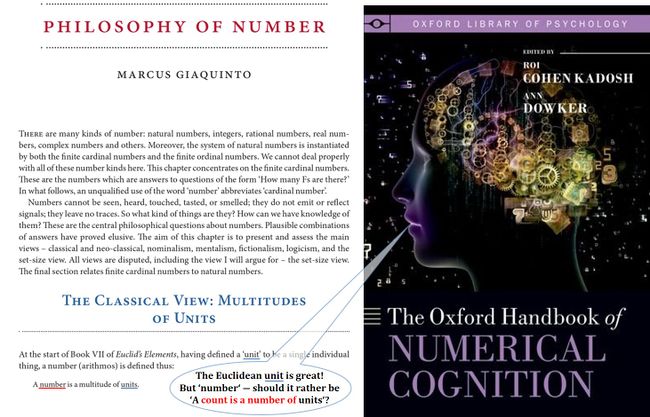Giaquinto 2015 Oxford Univ Press
| Giaquinto M (2015) Philosophy of number. In Kadosh RC, Dowker A (ed) The Oxford handbook of numerical cognition. Oxford Univ Press:17-32. https://doi.org/10.1093/oxfordhb/9780199642342.013.039 |
» Oxford Academic - Open Access
Giaquinto Marcus (2015) Oxford Univ Press
Abstract: There are many kinds of number. This chapter concentrates on finite cardinal numbers, as they have a basic role in our thinking. Numbers cannot be seen, heard, touched, tasted, or smelled; they do not emit or reflect signals; they leave no traces. So what kind of thing are they? How can we have knowledge of them? The aim of this chapter is to present and assess the main answers to these questions – classical and neo-classical, nominalism, mentalism, fictionalism, logicism, and the set-size view. All views are disputed, including the view I will argue for, the set-size view. The final section relates the finite cardinal numbers to the natural numbers.
• Bioblast editor: Gnaiger E
Chapter 2: Philosophy of number by Giaquinto Marcus
- Numbers cannot be seen, heard, touched, tasted, or smelled; they do not emit or reflect signals; they leave no traces. So what kind of things are they? These are the central philosophical questions about numbers. Plausible combinations of answers have proved elusive.
Cited by
- Gnaiger E (2024) Addressing the ambiguity crisis in bioenergetics and thermodynamics. MitoFit Preprints 2024.3. https://doi.org/10.26124/mitofit:2024-0003
- Gnaiger E (2020) Canonical reviewer's comments on: Bureau International des Poids et Mesures (2019) The International System of Units (SI) 9th ed. MitoFit Preprint Arch 2020.4 doi:10.26124/mitofit:200004.
Labels:
International System of Units, Number, MitoFit 2020.4, X-mass Carol, Gnaiger 2024 MitoFit




